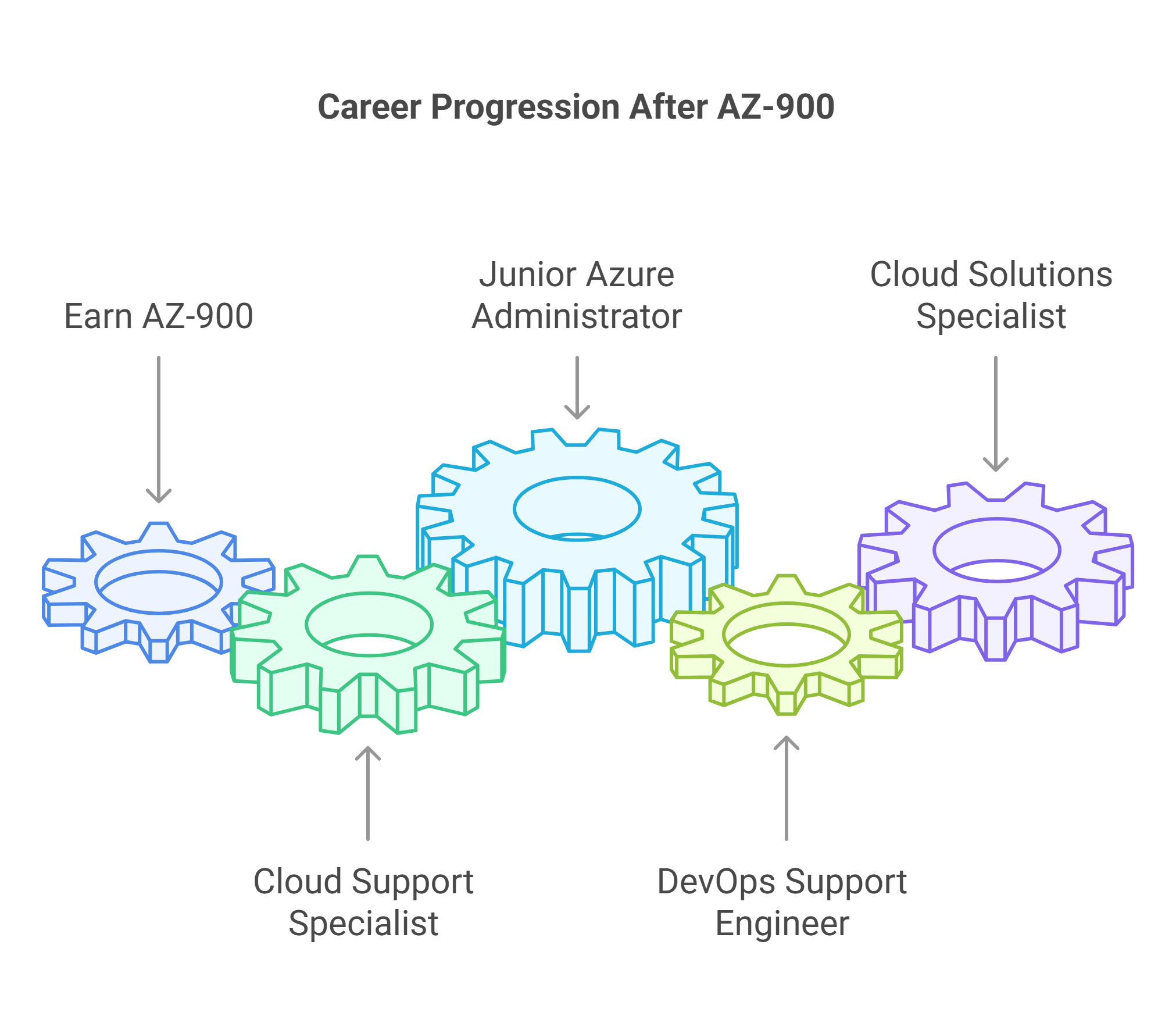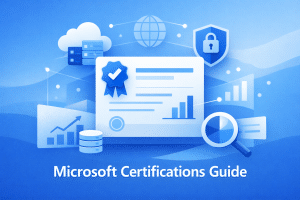If you’ve been eyeing a career in cloud computing, you’ve probably come across the AZ-900 certification. It’s often called the starting point for anyone looking to dive into Microsoft Azure, one of the most popular cloud platforms in the world.
But here’s the big question: does this foundational certification really make a difference in today’s competitive job market?
The answer is a resounding yes! In 2026, as businesses continue to migrate to the cloud, even entry-level certifications like AZ-900 are gaining more recognition.
Let’s explore how this certification can shape your career, the kind of roles you can expect, salary trends, and what the future holds for Azure-certified professionals.
High-Demand Roles for AZ-900 Certified Professionals in 2026
Cloud computing is no longer a buzzword; it’s the backbone of modern businesses. In 2026, as companies increasingly depend on Azure, the AZ-900 certification has become more valuable than ever.
This basic certification opens doors to various roles, proving that even a few foundational knowledge and understanding of cloud concepts can significantly impact your career.
Let’s look at some high-demand roles waiting for AZ-900 holders and how they’re shaping the workforce.
For a complete breakdown of objectives, skills measured, and exam details, you can refer to our AZ-900 certification guide before diving deeper.
Entry-Level Roles Designed for AZ-900 Holders
The AZ-900 certification is specifically targeted at beginners, making it ideal for individuals stepping into cloud careers for the first time. Here are some roles that fit perfectly for those with this cert:
Cloud Support Associate: These professionals assist in troubleshooting basic cloud issues, configuring resources, and ensuring smooth operations for cloud providers and end-users.
Technical Sales Representative: In this role, AZ-900 knowledge helps you explain Azure solutions to potential clients, bridging the gap between technical teams and customers.
IT Help Desk Technician: Many organizations prioritize candidates who can handle basic cloud-related queries along with traditional IT support responsibilities.
These positions don’t require deep technical expertise but heavily benefit from a more fundamental knowledge and understanding of Azure, which AZ-900 provides.
Cloud Support Associates and Their Growing Responsibilities
As businesses move more operations to Azure, Cloud Support Associates are becoming critical. These roles involve:
- Monitoring cloud systems for potential issues.
- Providing support to users experiencing connectivity or configuration challenges.
- Assisting teams in deploying and managing Azure resources.
Even though these are entry-level roles, they’re far from static. In 2026, companies expect Cloud Support Associates to quickly grow into more specialized positions like Cloud Administrators or DevOps Engineers. With Azure’s expanding ecosystem, this role is more dynamic and offers significant learning opportunities.
Azure Admin Assistants: Bridging Operational Gaps
For many businesses, the transition to Azure isn’t smooth. That’s where Azure Admin Assistants step in. These professionals bridge IT teams and Azure operations, ensuring that resources are properly configured and running efficiently.
Responsibilities include:
- Setting up virtual machines and storage accounts.
- Managing user permissions to maintain system security.
- Assisting with cost optimization by monitoring resource usage.
While this role might seem straightforward, organizations must maintain control over their Azure environments. AZ-900 cert holders are well-prepared to handle these tasks, making this role an excellent starting point for a cloud career.
The Evolving Demand for Hybrid IT Professionals with AZ-900
The lines between traditional IT roles and cloud-focused positions are blurring. Companies are now looking for hybrid IT professionals who can handle on-premises systems while understanding cloud environments.
For example, a Systems Administrator who can also set up Azure services is far more valuable than one without cloud skills.
Similarly, project managers with an AZ-900 certification can better oversee cloud migration projects by understanding the basics of Azure.
This hybrid demand is pushing AZ-900 holders into roles that might not have been traditionally considered “cloud jobs,” showing just how versatile this certification is.
Industries Leading the Charge in Hiring Azure-Trained Employees
Some industries are more aggressive than others in adopting Azure, which directly influences the demand for AZ-900 certified professionals.
Healthcare: As hospitals and clinics adopt cloud-based systems for patient records and telemedicine, they require support staff who understand Azure’s security and compliance features.
Retail: With the rise of e-commerce, retail giants rely on Azure for inventory management, customer data analysis, and personalized shopping experiences.
Finance: Banks and financial institutions are adopting Azure for secure, scalable, and compliant data handling. Entry-level roles often involve managing basic cloud resources to support these functions.
Education: Schools and universities need cloud-trained professionals to manage virtual classrooms, online resources, and administrative systems.
Government: Public sector agencies are increasingly hiring Azure-certified staff to modernize IT systems while maintaining security and reliability.
Why AZ-900 Professionals Are in High Demand
The growing popularity of Azure, combined with the certification’s focus on practical, foundational skills, makes AZ-900 professionals indispensable. Companies aren’t just looking for specialists—they want team members who understand the basics and can contribute immediately.
In 2026, this demand isn’t slowing down. If anything, it’s growing as Azure continues to dominate the cloud landscape.
Whether you’re stepping into IT for the first time or transitioning from another field, an AZ-900 certification is your first step to making a mark in the the cloud services industry.
Where AZ-900 Fits in the Cloud Career Ladder
Starting a cloud computing journey can feel overwhelming with all the certifications, roles, and technologies out there. But here’s the good news: the AZ-900 certification isn’t just a starting point; it’s a solid foundation that can propel you toward bigger and better opportunities in the Azure ecosystem.
Let’s break down how AZ-900 fits into the cloud career ladder, the growth options it opens up, and how employers view it in the context of more advanced certifications.
From AZ-900 to Mid-Level Roles: A Practical Pathway
The AZ-900 certification is designed to introduce you to cloud basics. While it’s not a technical or hands-on cert, it lays the groundwork for transitioning to more advanced roles in Azure.
After earning your AZ-900, here’s a realistic pathway to climb the career ladder:
Cloud Support Specialist: Leverage your foundational Azure knowledge to troubleshoot and assist teams with basic cloud tasks. This role often involves monitoring systems, managing Azure resources, and helping users navigate cloud features.
Junior Azure Administrator: With additional hands-on experience or certifications like AZ-104 (Azure Administrator Associate), you can move into junior cloud administrator roles focused on managing and maintaining Azure environments.
DevOps Support Engineer: Add a bit of DevOps knowledge, and you can support automation processes and CI/CD pipelines in an Azure environment.
Cloud Solutions Specialist: Develop expertise in deploying Azure services for business use cases, bridging the gap between business needs and cloud capabilities.

Upskilling Options for AZ-900 Holders to Specialize Further
While AZ-900 provides a broad overview of Azure, progressing in the cloud computing world requires deeper specialization. Thankfully, Microsoft offers clear pathways for AZ-900 holders to upskill.
Here’s a roadmap to build your expertise:
- AZ-104 (Azure Administrator Associate): This is the logical next step for anyone with AZ-900. It’s hands-on and focuses on managing Azure resources, identities, and governance.
- AZ-204 (Azure Developer Associate): If you’re interested in coding and application development, this cert teaches you how to build and deploy apps in Azure.
- AZ-500 (Azure Security Engineer Associate): For those who want to dive into security, this certification focuses on securing Azure environments and managing identity and access.
- AZ-305 (Azure Solutions Architect Expert): This is a top-tier cert for those aiming to design cloud solutions. While it’s advanced, starting with AZ-900 makes it easier to understand the foundational concepts.
Additionally, don’t ignore hands-on machine learning. Platforms like Azure’s free tier or sandbox environments give you real-world experience, which is essential as you climb the ladder.
How Employers View AZ-900 in the Context of Broader Azure Certifications
To employers, the AZ-900 certification signals two important things:
You’re proactive about learning: It shows that you’ve taken the initiative to understand cloud basics, which sets you apart from candidates with no cloud knowledge.
You understand the fundamentals: While it’s not a technical certification, AZ-900 ensures you can speak the cloud language, making it easier to integrate into teams and projects.
However, employers don’t see AZ-900 as the endpoint, it’s the beginning of your Azure journey. They often value it more when it’s paired with additional certifications or practical experience.
For example:
A hiring manager for a Junior Azure Administrator role may prioritize AZ-900 holders who are also working on their AZ-104.
For Sales or Pre-Sales roles, having AZ-900 alongside communication or business skills can make you a preferred candidate.
Employers also appreciate when candidates use AZ-900 as a stepping stone to explore other Azure certifications, as it demonstrates a commitment to growing within the cloud space.
Salary Benchmarks for AZ-900 Professionals
The AZ-900 certification is often considered an entry point into cloud computing careers, but even entry-level roles can offer competitive pay, especially as the demand for more cloud technology professionals continues to grow in 2026. Let’s break down the salary expectations for AZ-900 certified individuals, explore regional variations, and highlight companies willing to pay a premium for Azure foundational certifications.
What to Expect as an AZ-900 Certified Fresher in 2026
For those stepping into the cloud industry with an AZ-900 certification, salaries are encouraging. While you may not land a six-figure salary as a fresher, the earning potential is promising due to the high demand for Azure skills.
On average, here’s what AZ-900 certified professionals can expect in 2026:
Entry-Level Roles:
Cloud Support Associate: $55,000 to $65,000 per year in the U.S.
Azure Administrator Trainee: $60,000 to $70,000 annually, depending on location.
Technical Sales Associate: $50,000 to $60,000 per year, with additional performance-based bonuses.
While these figures vary by region, they reflect the growing value employers place on candidates with even a basic understanding of Azure concepts. Additionally, AZ-900 holders often receive opportunities for skill development and rapid advancement, which can significantly boost earnings within a few years.
If you’re still deciding between Microsoft Azure or AWS as your first step, our AZ-900 vs CLF-C02 comparison highlights which certification fits best for beginners.
Regional Variations in Salary for Azure Fundamentals Certification
Salary expectations for AZ-900 certified professionals differ widely based on geography. Here’s a snapshot of what you can anticipate across regions:
United States
The U.S. remains one of the most lucrative markets for cloud professionals.
- Average Salary: $60,000 to $75,000 annually for entry-level roles.
- High-Demand Cities: San Francisco, Seattle, Austin, and New York offer premium salaries, often exceeding $80,000 for certain roles.
- Cost of Living Consideration: Cities with higher salaries typically come with increased living costs, so balancing compensation with expenses is key.
Europe
Europe presents a mix of opportunities, with salaries varying between Western and Eastern countries.
- Western Europe:
- Countries like Germany, the UK, and the Netherlands offer salaries ranging from €45,000 to €60,000 annually for AZ-900 certified roles.
- Cities like London and Amsterdam often provide the highest pay, though competition is steeper.
- Eastern Europe:
- Salaries in regions like Poland and Romania range between €30,000 and €40,000, but the cost of living is much lower, offering a decent standard of living.
Asia
Asia’s cloud market is rapidly expanding, particularly in countries like India, Singapore, and China.
- India:
- Entry-level salaries range from ₹500,000 to ₹800,000 annually, depending on the city and company.
- Cities like Bangalore and Hyderabad are hubs for cloud jobs, with multinational companies leading hiring trends.
- Singapore:
- Salaries range from SGD 45,000 to SGD 60,000 for AZ-900 certified professionals, making it one of the best-paying markets in Asia.
- China:
- Entry-level roles in major tech hubs like Beijing and Shanghai offer competitive pay, ranging from ¥120,000 to ¥180,000 annually.
The Rising Value of AZ-900 Certification in Salaries
While AZ-900 doesn’t promise the highest salaries in the cloud industry, it positions professionals for consistent growth. The certification reflects a foundational understanding of Azure, which is increasingly valued as companies shift to hybrid and multi-cloud infrastructures.
In 2026, AZ-900 certified professionals are not just landing jobs, they’re laying the groundwork for lucrative careers in one of the fastest-growing industries worldwide. With a strategic approach to skill-building and role progression, the earning potential and job outlook for these individuals continues to climb.
To maximize your chances of success, follow our step-by-step AZ-900 exam tips and strategies designed for first-time test takers.
How to Stay Competitive as an AZ-900 Certified Professional
Holding an AZ-900 certification opens up doors to exciting opportunities, but staying ahead in the fast-paced cloud industry requires more than just the credential. As the Azure job market evolves in 2026, building additional skills, gaining hands-on experience, and leveraging community resources can make all the difference. Let’s explore how you can remain competitive, land top roles, and keep growing your career.
Key Skills to Complement Your Certification in 2026
An AZ-900 cert showcases your understanding extensive knowledge of Azure fundamentals, but pairing it with complementary skills can significantly boost your market value. Here are some in-demand skills to consider:
- Basic Scripting Knowledge
Employers value candidates who understand scripting languages like Python, PowerShell, or Bash. These skills help automate tasks and improve efficiency in Azure environments. - Networking Basics
Understanding networking concepts like DNS, IP addressing, and firewalls is critical for working in cloud ecosystems. Basic networking knowledge aligns with many Azure tasks, making you more versatile. - Cloud Security Awareness
Security is a top priority in cloud computing. Familiarizing yourself with Azure Security Center, identity management (Azure AD), and encryption methods can set you apart. - Data and Analytics Basics
With data playing a central role in business, learning tools like Azure Synapse Analytics or Power BI can be an excellent addition to your resume. - Knowledge of Hybrid Cloud Models
Many companies operate in hybrid environments. Understanding how Azure integrates with on-premises systems or other cloud platforms can make you a valuable asset.
The Importance of Practical Azure Experience in Landing Roles
While certifications are essential, hands-on experience can make or break your chances of securing a job. Employers often look for candidates who can apply their knowledge in real-world scenarios.
- Create Your Azure Sandbox
Set up a free Azure account and experiment with core services like virtual machines, storage accounts, and resource groups. This hands-on experience will boost your confidence and prepare you for interviews. - Contribute to Open-Source Projects
Look for open-source projects involving Azure tools or technologies. Contributing to these projects not only strengthens your practical skills but also helps you build a professional portfolio. - Volunteer or Freelance Work
Offer to assist small businesses or nonprofits in setting up their Azure infrastructure. These projects can provide valuable experience and strong references for your career.
Leveraging Azure Community Resources to Stay Updated
The Azure ecosystem is constantly evolving, and staying informed is key to staying competitive. Here are some resources to keep you in the loop:
- Microsoft Learn
Microsoft’s free learning platform is packed with Azure tutorials, labs, and certification prep courses. Make it your go-to resource for updates and skill enhancement. - Azure Blog and Updates
Follow the official Azure blog to stay informed about new features, tools, and best practices. - LinkedIn and Social Media Groups
Join Azure-specific groups and forums on platforms like LinkedIn, Reddit, or Discord. Engaging in discussions with other professionals helps you learn from their experiences and challenges. - Azure User Groups and Meetups
Attend local or virtual meetups to network with industry professionals, share ideas, and learn about real-world Azure implementations. - Azure Certifications Forum
Participate in forums dedicated to Azure certifications. These platforms often provide insights into exam preparation, study tips, and career guidance.
Learn more about Microsoft AZ-900 exam here: https://certempire.com/az-900-exam-tips-and-strategies/
Use Cert Empire Exam Dumps to Ace the Exam
Passing the AZ-900 certification exam requires focused preparation, and that’s where Cert Empire Exam Dumps can be a game-changer. Here’s how they help:
- Accurate Practice Questions
Cert Empire exam dumps feature real and updated exam questions. Practicing these ensures you’re familiar with the types of questions you’ll face in the actual test. - Detailed Explanations
Each question comes with a thorough explanation, helping you understand the concepts behind the answers. This clarity ensures you’re not just memorizing but actually learning. - Boosts Confidence
Going through mock exams included in the dumps can significantly increase your confidence. You’ll know what to expect and be prepared to tackle the test with ease. - Saves Time
Instead of sifting through multiple resources, Cert Empire consolidates everything into a single, easy-to-follow format. This approach saves time and streamlines your prep process. - Proven Track Record
Many AZ-900 certified professionals credit their success to Cert Empire’s reliable and accurate dumps. Learn more about Cert Empire’s AZ-900 Exam Dumps here.
By combining Cert Empire resources with hands-on practice and a commitment to learning, you can ace the exam and stay ahead in your cloud career.
Take Action Now!
The cloud industry is brimming with opportunities, and AZ-900 is your ticket to entering this dynamic field. But remember, the key to staying competitive lies in continuous learning, gaining practical experience, and staying updated on Azure advancements. Take advantage of community resources, upskill in relevant areas, and utilize Cert Empire’s exam dumps to ace your certification journey. Your next big opportunity is waiting, make sure you’re ready for it!
FAQs
Can an AZ-900 certification help me switch careers?
Yes, it’s an excellent starting point for transitioning into cloud careers, even for those with little to no IT background. Employers value the certification as proof of and demonstrate foundational knowledge of cloud knowledge.
What’s the average starting salary for AZ-900 holders in 2026?
The average starting salary ranges from $60,000 to $80,000 annually, depending on your location and additional skills.
Which Azure certification should I pursue after AZ-900?
The Azure Administrator Associate (AZ-104) is a popular next step, offering more advanced skills and career growth opportunities.
Are remote jobs available for AZ-900 certified professionals?
Yes, remote roles like Cloud Support Associate and Junior Azure Admin are widely available, especially in the U.S. and Europe.
Do employers prefer experience over certifications?
Employers value both, but combining practical experience with certifications like AZ-900 gives you a competitive edge.


























